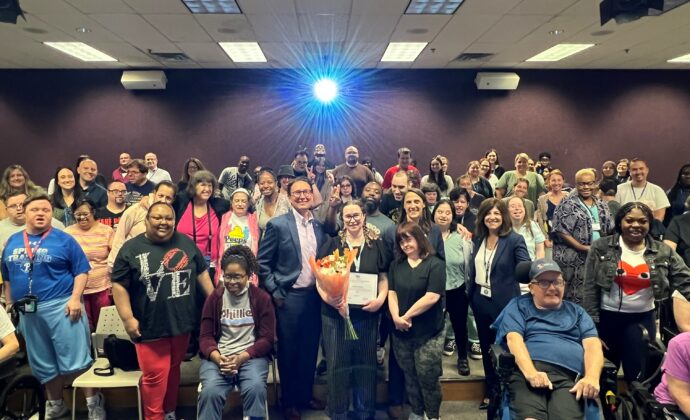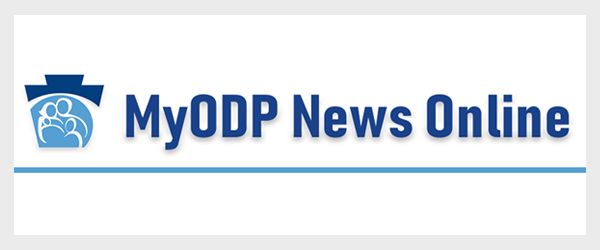
ODP Celebrates One-thousandth PA E-Badge Academy Certificate With SPIN
Heather Radcliffe became a Direct Support Professional (DSP) three years ago. Before that she worked for an online clothing retailer in a warehouse. She was looking for more meaningful work, and deep down she knew she would love being a DSP.
“My husband, actually, had already been working for SPIN,” Heather recounts, “and he has been a DSP almost his whole life because he started supporting his own brother.”
SPIN is a family affair for the Radcliffes. Heather’s brother in-law Dan Radcliffe (no, not that one) attends SPIN’s Community Participation Support service where he engages in community-based activities led by DSPs like Heather and her husband Ben.
“Dan has grown up with SPIN. It’s his favorite place in the whole world.”
The E-Badge Academy
SPIN has a knack for fostering growth and community. The organization, which is located in northeast Philadelphia, has structured its DSP training curriculum around the National Alliance for Direct Support Professionals’ (NADSP) E-Badge Academy.
The E-Badge Academy allows DSPs and Frontline Supervisors (FLSs) the opportunity to earn accredited DSP education hours while also being formally recognized for their efforts at building core competencies.
SPIN currently has sixty-six DSPs enrolled in the E-Badge Academy. The organization’s President & CEO, Judy Dotzman, recognizes the importance of distinguishing DSP accreditation as a core component of workforce development. “Heather is just one of so many who have invested in their personal and professional development,” says Dotzman. “SPIN has been invested in the advancement of direct support professionals throughout its history. This is a priority of this organization. We’ve been members of the National Alliance for Direct Support Professionals since its beginnings, and we’ve had our direct support professionals participating in the very evolution of the NADSP accreditation process.”

Division Director of Workforce Development Chelsea Lutts lauds the program for its ability to provide supports professionals with a framework to build supports plans.
“One of the more unique things about the E-Badge Academy is testimonials,” says Lutts, “there’s different themes for each of the fifteen badges where the DSP provides a reflection on that theme. For example, one is friendship, and it asks how the DSP has helped the person they’re supporting to develop friendships.”
E-Badge testimonials are reflections submitted by enrolled DSPs that breakdown different components of the job. Each testimonial connects to the foundation of the NADSP Code of Ethics and provides an opportunity for DSPs to reflect on their work. All NADSP E-Badges incorporate a Centers for Medicare & Medicaid Services (CMS) Core Competency Area including Communication, Person-Centered Practices, Safety, Health and Wellness, and Cultural Competency to name a few.
“It makes you feel like you’re prepared so you can be proactive instead of reactive,” Heather Radcliffe reflects on her E-Badge training, “It definitely needs to be the standard.”
Upon completing the E-Badge Academy DSP I certification level, Heather was promoted to SPIN’s Activity Specialist position, highlighting a goal of ODP to create career ladders and improve staff retention.
“Being a DSP is how I found my love for facilitating and leading the activities and, fast forward, now I’m in school to become a certified Recreation Therapist.” Heather credits the E-Badge Academy training for broadening her career aspirations.
“The training that I had [in the past] was helpful, but this was a deep dive. With this certification, you can move up.”
Celebrating One-Thousand Certified DSPs in Pennsylvania

Heather Radcliffe is the one-thousandth DSP in Pennsylvania to complete the E-Badge Academy certification. To celebrate this milestone in Pennsylvania’s DSP workforce development, the Office of Developmental Programs visited SPIN to present Heather with a signed proclamation of recognition from Governor Josh Shapiro.
At the ceremony on Tuesday, July 23rd, Deputy Secretary Kristin Ahrens celebrated the contributions of all DSPs.
“We ask DSPs to do a lot. Sometimes, DSPs are the difference between someone having an everyday life or not. It can be tough work, and it takes a lot of dedication.”
Deputy Secretary Ahrens emphasized why ODP is making a concerted effort to recognize DSPs for their professional development – the profession isn’t currently recognized by the Standard Occupational Classification (SOC) system established by the U.S. Bureau of Labor Statistics.
“That’s what gets counted. At the national level when their making policy, in Harrisburg when we’re making policy, we’re often looking at how many. How many registered nurses? How many certified nursing assistants? How many rehab consultants? We can count those because we’ve given those that official stamp. DSPs need that official professional recognition.”
Beyond providing tools for a well-trained workforce, NADSP is promoting the E-Badge Academy as a national credentialing standard to cement recognition of the direct support profession in the SOC.
Jeremy Yale, ODP’s Bureau Director of Policy, Training, and Quality Management followed up with a bit of background on the Commonwealth’s credentialling efforts.
“The Office of Developmental Programs has been at this for a number of years. We’ve been looking at credentialing since 2017 […] and today, marking one-thousand certified DSPs, is really a demonstration to our progress.”
Pennsylvania has been recognized as a leader in DSP credentialing. NADSP’s monthly E-Badge Earner of the Month report regularly features support professionals from Pennsylvania. Moreover, on April 16th, SPIN E-Badge certified DSP Nick Smith testified at a United States Senate Special Committee on Aging hearing that addressed workforce shortages and legislation to improve the caring professions.
“The work that DSPs do is absolutely critical,” says Deputy Secretary Ahrens.
“DSPs are the difference between someone being healthy and safe [or not]. We ask DSPs to help people communicate, we ask DSPs to help figure out some tough stuff – how to get a job in the community, how to communicate with your boss who may not understand why you’re coming to the work a little differently – we ask DSPs to navigate a world that is often pretty hostile and not adaptive for people with disabilities.”
Heather took that challenge head on, “I jumped right in without much experience, and I fell in love with it. Starting as a DSP, I was really interested in getting to know each individual and how to help them on an individual level. Every E-Badge training was so specific, detailed, and focused on one thing at a time, and I really liked that because it helped me do what I really wanted to do – Individualize plans, make sure they’re person-centered, and ensure my support is really engaging.”
The Office of Developmental Programs thanks Heather and all of the dedicated DSPs throughout the Commonwealth for their outstanding contributions toward helping Pennsylvanians with disabilities achieve an everyday life.


